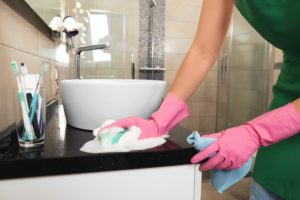
Not all surfaces in our homes can be sanitized the same way. Doing so might even damage your home and furniture!
There’s no doubt that cleaning and disinfecting our homes right now is at the forefront of many people’s minds. Surfaces and furniture that we invest in to create our ideal living space are important to protect when disinfecting. As far as the kitchen is concerned, keeping this space clean and sanitized should be a regular occurrence. Our homes’ surfaces are utilized for many activities, and some need special care as not to damage them. Here are four types of surfaces and materials that require specific instruction to safely clean and disinfect throughout your home.
Stone Countertops
Stone countertops come in many forms, including granite, marble, quartz, and other natural stones. Some come in slabs, and some are engineered with a mixture of minerals and stones, such as quartz and concrete counters. Stone often cannot be cleaned and sanitized with regular household cleaners containing bleach and alcohol. This can ruin their appearance. The best way to disinfect most stone countertops is to use a soft cloth to wipe down counters with warm water and mild dish soap. Use a second clean, wet cloth to rinse away the soapy water, then wipe dry with another clean towel. You should take care to clean messes right away to avoid stains, and never use abrasive cleaners or scrubbers. Reapply sealant, according to manufacturer recommendations, to preserve the appearance of your counters.
Kitchen Sink
Kitchen sinks are often one of the germiest areas in our home, more so than our bathrooms if you can believe it. It’s recommended to deep clean and disinfect the sink at least once a week, and after working with raw meat. For most kitchen sink basins, like ceramic or stainless steel, you can take a sponge and dish soap to loosen food stains, soap deposits, rust, and other grime. You can use a small amount of baking soda for gentle scrubbing to remove stubborn spots or consider cleaning with a scrub with bleach. Another option is spraying the sink with a bleach and water mixture and allowing it to sit for 5 minutes and then rinse. If you’re anti-bleach, try hydrogen peroxide instead.
Wood Cabinets
Occasionally, we must clean cabinets due to accidental spills or cross-contamination from touching. You cannot use alcohol wipes on wood cabinets, and marketed wood cleaners aren’t guaranteed to disinfect. To disinfect without damaging your beautiful wood, wipe away surface dust and grime and use dish soap and water. Dry well and then go over cabinets and furniture with a wood polish if you like.
Hardwood, Vinyl, and Tile Floors
Hardwood, luxury vinyl, and tile floors are common in most households. Each type of flooring will require special, but not difficult, care to disinfect without damage. Sealed hardwood floors should never be in contact with moisture for long, as it can warp the boards. Using a steam cleaning method or mopping with a dilution of dish soap and water can disinfect without the worry of unsanitized floors or prolonged water exposure. Just be sure to work quickly in small sections and wipe dry your hardwood floors as you go. A dilution of vinegar and water or hardwood floor product can follow to give a streak free finish. Be aware that ammonia-based cleaning chemicals damage luxury vinyl floor tiles and planks. Again, mopping your floors with a white vinegar solution with a few drops of dishwashing liquid is a safe and effective method for killing germs. When cleaning vinyl floors, be sure to mop a second time to rinse away residue that dulls vinyl flooring’s appearance. Different types of tile will require individual disinfecting regimes. The most popular bathroom floor tiles are porcelain and ceramic tiles. These tiles are waterproof, so using soap and water or a tile safe cleaner will work. With a clean sponge or rag, scrub, mop or wipe down the tiles. If you wish, finish by rinsing the tiles with water or a water/vinegar solution. It’s safe to let the ceramic tiles air dry. Disinfecting your bathroom floor tiles can keep mold and mildew away, as well.
Design and Build Your Dream Home with Columbia Builders!
Columbia Builders is the home builder of choice in Howard County, offering homes in Ellicott City, Elkridge, Laurel, Columbia, Marriottsville, Fulton, Clarksville, Dayton, and Brookeville. No matter what the size and scope of your project, we have the skills, experience, and resources needed to bring your vision to life. We offer a level of customization that is truly unmatched and are committed to using materials and craftsmen of the highest quality, so you can trust that your new home is built to last.
If you’re ready to invest in a home that is built with your needs in mind, trust in us. Give Columbia Builders a call today at 410-730-0215 or use our contact form here. You can also keep up with us on Facebook, Twitter, Houzz, and Youtube, and don’t forget to check back on our blog for more tips and information!
